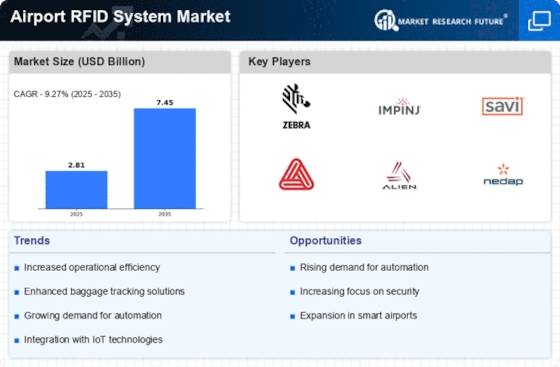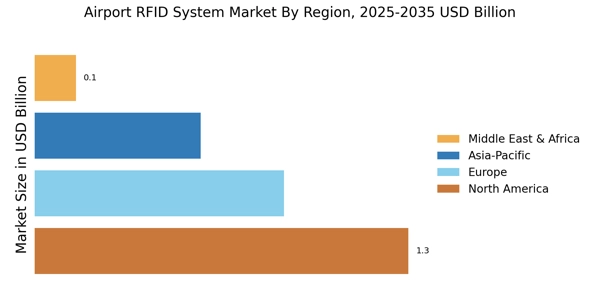Enhanced Data Analytics Capabilities
The airport rfid system Market is benefiting from enhanced data analytics capabilities that RFID technology offers. By utilizing RFID systems, airports can collect and analyze vast amounts of data related to passenger flow, baggage handling, and operational efficiency. This data-driven approach allows airports to make informed decisions, optimize resource allocation, and improve overall service quality. As the aviation sector increasingly relies on data analytics for strategic planning, the demand for RFID systems is expected to rise. This trend indicates a shift towards more intelligent airport operations, further propelling the growth of the Airport RFID System Market.
Growing Demand for Contactless Solutions
The Airport RFID System Market is witnessing a growing demand for contactless solutions, driven by the need for enhanced hygiene and safety in airport operations. RFID technology enables contactless check-in and boarding processes, minimizing physical interactions between passengers and airport staff. This shift towards contactless solutions is becoming increasingly important as travelers prioritize safety and convenience. Market analysis suggests that the contactless technology segment within the Airport RFID System Market could experience a growth rate of approximately 20% over the next few years. This trend underscores the evolving preferences of travelers and the need for airports to adapt accordingly.
Increased Efficiency in Baggage Handling
The Airport RFID System Market is experiencing a surge in demand due to the need for increased efficiency in baggage handling processes. RFID technology enables real-time tracking of luggage, significantly reducing the chances of lost or mishandled bags. According to recent data, airports implementing RFID systems have reported a reduction in baggage mishandling rates by up to 25%. This efficiency not only enhances passenger satisfaction but also streamlines airport operations, leading to cost savings. As airlines and airports continue to prioritize operational efficiency, the adoption of RFID systems is likely to grow, further driving the Airport RFID System Market.
Integration with Smart Airport Initiatives
The Airport RFID System Market is being propelled by the integration of RFID technology into smart airport initiatives. Airports are increasingly adopting smart technologies to enhance passenger experience and operational efficiency. RFID systems facilitate seamless check-in processes, automated baggage tracking, and real-time information sharing. This integration aligns with the broader trend of digital transformation in the aviation sector. As airports invest in smart technologies, the demand for RFID solutions is expected to rise, potentially leading to a market growth rate of over 15% annually. This trend indicates a promising future for the Airport RFID System Market.
Regulatory Compliance and Safety Standards
The Airport RFID System Market is influenced by stringent regulatory compliance and safety standards imposed by aviation authorities. These regulations often mandate the use of advanced tracking systems to ensure the safety and security of passengers and cargo. RFID technology provides a reliable solution for meeting these compliance requirements, as it allows for accurate tracking and monitoring of baggage and cargo. As regulatory bodies continue to emphasize safety, the adoption of RFID systems is likely to increase, thereby driving growth in the Airport RFID System Market. This trend highlights the critical role of compliance in shaping market dynamics.

















